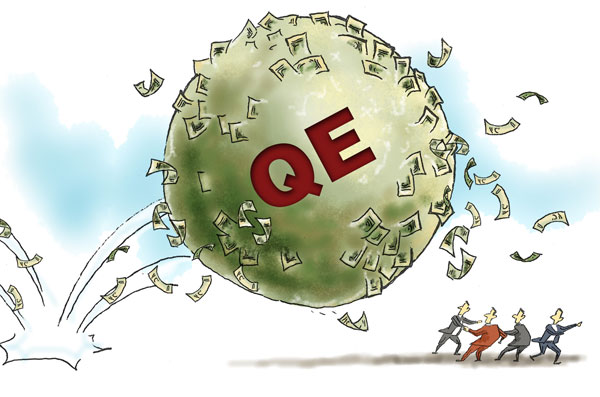
|
 |
|
Quantitative easing is an unconventional monetary policy used by a country‘s central bank to stimulate its economy when standard monetary policy has become ineffective. The world‘s first and third most powerful economies — the United States and Japan — are implementing QE policy but a senior Chinese economist warns that excessive money supply is like ”a tiger in a cage”. ”O(jiān)nce it is released, the consequences will be severe,” he said. Provided to China Daily |
Policy makers hesitant about next step as money supply increases a lot
A faster-than-expected increase in money supply and soaring bank credit but modest economic growth is an equation that has left Chinese monetary policy makers puzzled and hesitant about their next step.
Any impulse to ease or tighten monetary policy at the moment may lead to irretrievably awful results as economists reveal their helplessness.
Robert E. Hall and David H. Papell wrote in their book Macroeconomics — Economic Growth, Fluctuations and Policy — that ”unsound monetary policy is the chief culprit” leading to serious recession and inflation.
By the end of April, the broad money supply, or so-called M2, had exceeded 103.3 trillion yuan ($17 trillion), up by 16.1 percent from a year earlier, compared with a year-on-year growth of 15.7 percent in March, according to the central bank.
But the year‘s target for money supply increase was anchored at 13 percent, which requires an average lower-than-12 percent M2 growth rate in the final eight months of this year, meaning there will have to be relatively tightened monetary policy.
Up to the end of 2012, M2 in China was close to double the total value of the gross domestic product, higher than a world-recognized warning line of 1.5 for the M2/GDP ratio. In comparison, that ratio was only 0.32 in 1978.
Cheng Siwei, a renowned scholar in economic, financial and managerial fields and the former vice-chairman of the Standing Committee of the National People‘s Congress, warned that the excessive money supply is like ”a tiger in a cage”. ”O(jiān)nce it is released, the consequences will be severe.”
Cheng attributed high property prices and the recent rush to buy gold to the faster-than-expected increase in money supply. He is concerned about high inflation in the long term.
Since the year 2009, policy makers have written the annual M2 growth target into the annual government work report, which is announced by the premier at the opening of the National People‘s Congress every March.
Ji Zhihong, director of the research bureau of the People‘s Bank of China, said that for making monetary policy, the nation uses money supply as the key control tool, while also paying attention to other reference indexes including interest and exchange rates.
”The final target is to maintain price stability and steady economic growth,” said the bank official.